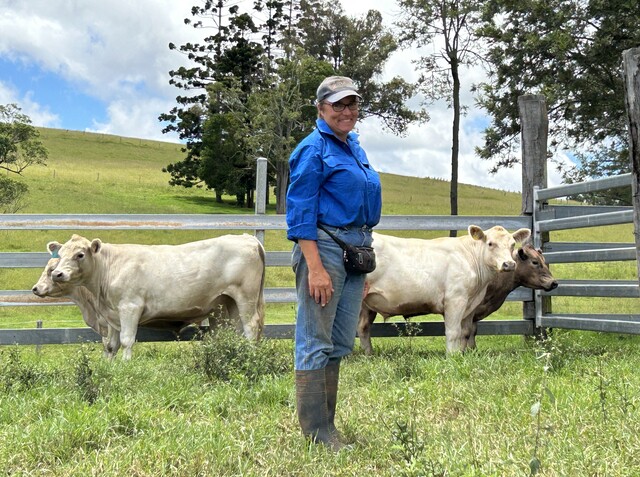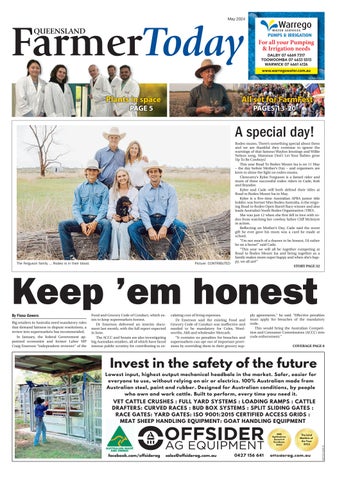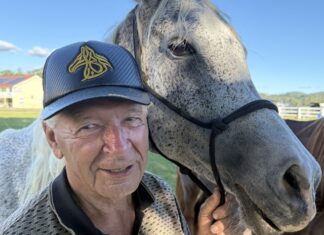PRECEDE: When it comes to carcase competitions, Square Meaters give all other breeds a run for their money. At the 2023 EKKA, Square Meaters took home the Eating Quality Award and the Grand Led Steer Carcass at the 2024 EKKA. This was the first Square Meater breeder from Queensland to win the EKKA carcase competition and the third in the country. This is Julie Gillies’s story.
Julie grew up on a mixed farming operation of pigs, sheep and dairy and from an early age she knew she had to be in amongst the action.
She was told that when she was between two and three years old, she helped her grandfather yard the sheep, complete with “farm” language.
She was dairying on her own around the age of seven and by the age of 14, when her father wound up in a wheelchair due to arthritis, she was dairying before and after school.
By the age of 16, Julie left high school and began running the family farm.
When she married at 22, she stepped back from the farm but still remained within reach when help was needed.
After 19 months of marriage, they moved to the picturesque Pechey Valley.
It started out as a farmsit, but 23 years later she would not change anything for the world.
Julie said by this stage of her life, she realised the family farm was going downhill, so from mid-late 2005 she came back and brought her two young girls.
Every morning the girls left home at 5am, milked the cows, and then put her eldest daughter on the school bus and then continued on with the day.
Her second daughter at the time was about 18 months to two years old.
Milk production was small and Julie lifted milk quality to highs their farm had never previously seen.
She had put her heart and soul into turning it into a viable farm, back to what her father had it in earlier years only on a smaller scale.
“I was doing things differently from how my dad would’ve done it,“ Julie said.
Julie was heartbroken when she realised she was not going to inherit the family farm so on 1 September 2006 with 11 cross-bred females she left the family farm.
“Although it’s not a massive asset to have, it’s the fact that I wasn’t allowed to do the one thing I still believe I was put on this earth to do, and that’s to farm,“ Julie said.
“Working with the animals and land is my entire life and not being able to keep the generational home going was heartbreaking to me.“
Two years later, Julie had another two children.
In 2008, her now husband Doug purchased a small herd of Square Meater females, with a bull calf in the mix.
“I asked Doug, what was I meant to do with these (Square Meaters), and he replied saying ’dunno, but you’ll figure it out’ I said ’well the one thing we won’t be doing is showing,“ Julie said.
“Little did I know.“
When they first moved to the property Doug used to buy steers from the Toogoolawah weaner sales, keep them for 12-18 months and turn them over ready for the next lot to come through.
Doug mentioned one day that this practice was now too dangerous for young children who were keen to help in the cattle yards.
Julie entered their first local show with her 10-month-old son strapped in the stroller and borrowed the neighbour’s ute, borrowed gear from a local lady who had previously shown horses, “she had to show me which way to parade around the ring.
“I had no idea about anything referring showing cattle, so it was a process to get used to,“ Julie said.
Over time they exhibited from Rockhampton to Canberra, always coming away with at least reserve champion, but her favourite show has always been the EKKA.
Julie considers it a privilege to show cattle at EKKA and see the public enjoy their time with her cattle.
She started in stud cattle exhibiting, then led steer judging and watched at least some of the competition, followed by the steer auction.
“I clearly remember saying at the time, how I’d never show steers as that’s a whole other world to the stud showing,“ Julie said.
“And I’d never have one of my carcasses hanging in the ‘shop window’ as that happens to “other” people.“
Over time she did eventually enter and win various hoof and hook prizes with the Square Meaters doing what she loved best.
Sunset Park was the first Square Meater in QLD to win at the EKKA Carcase comp.
Julie said she wants all commercial breeders to consider putting some Square Meater into their herd as they are a stand-out carcase animal with low inputs.
“They do not need the same amount of grass as the bigger breeds,“ she said.
“I can tag our newborn calves in the paddock without the fear of cows and this highlights the temperament.
“Steers do not need to be grain-finished and are a breed that can be grass-finished.
“The feed conversion rate is very good and this is a bonus in tougher times.“
Julie believes that she can run more cattle per acre and put more calves on the ground with Square Meater than her other mixed breed.
“They are a breed that suits the butcher market,“ she said.









